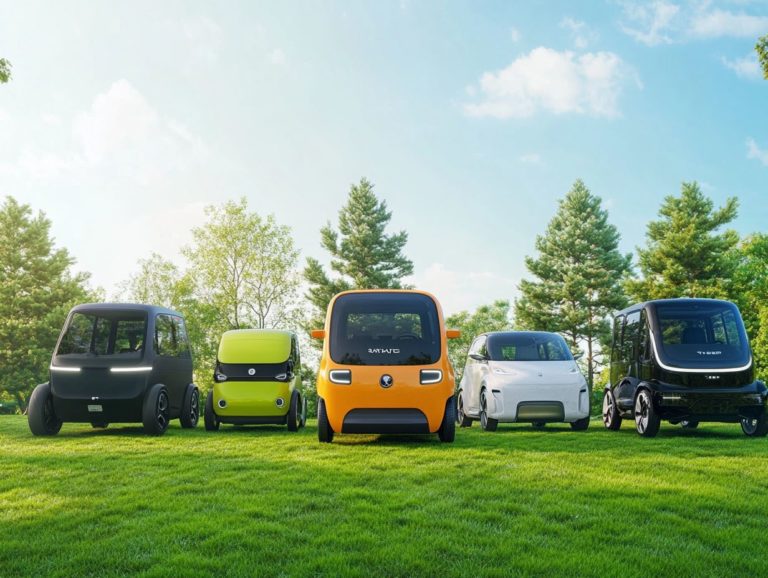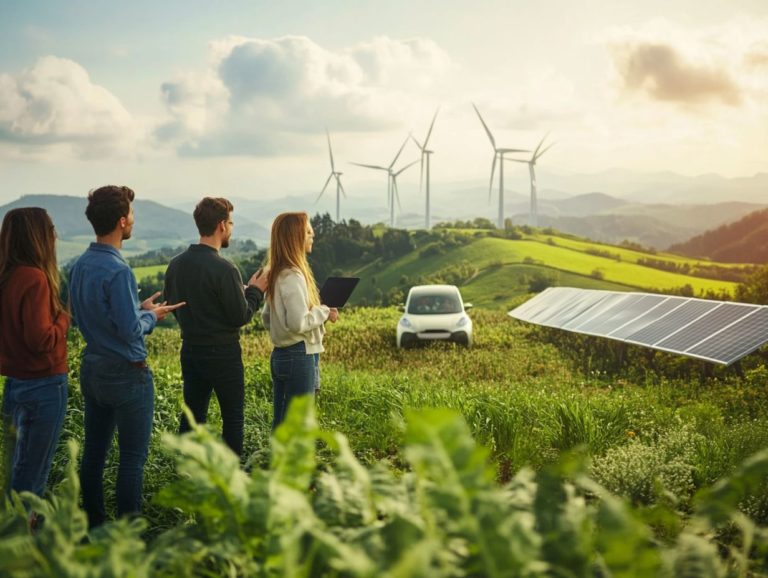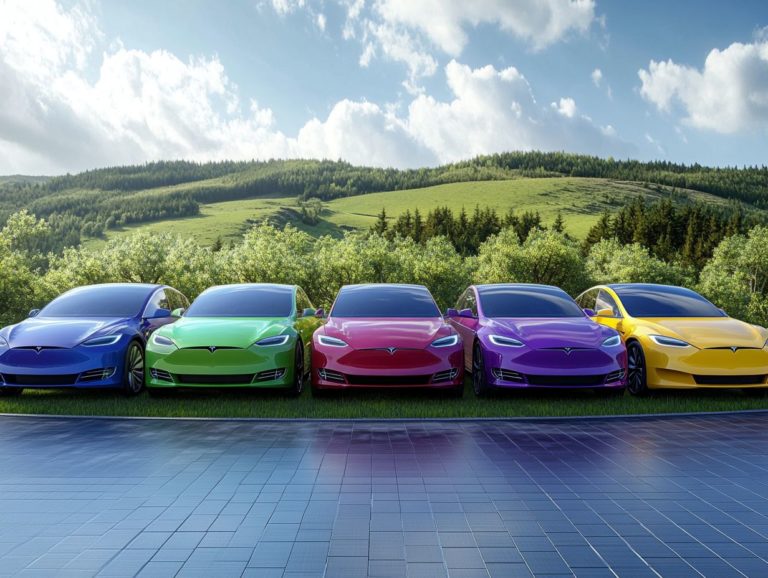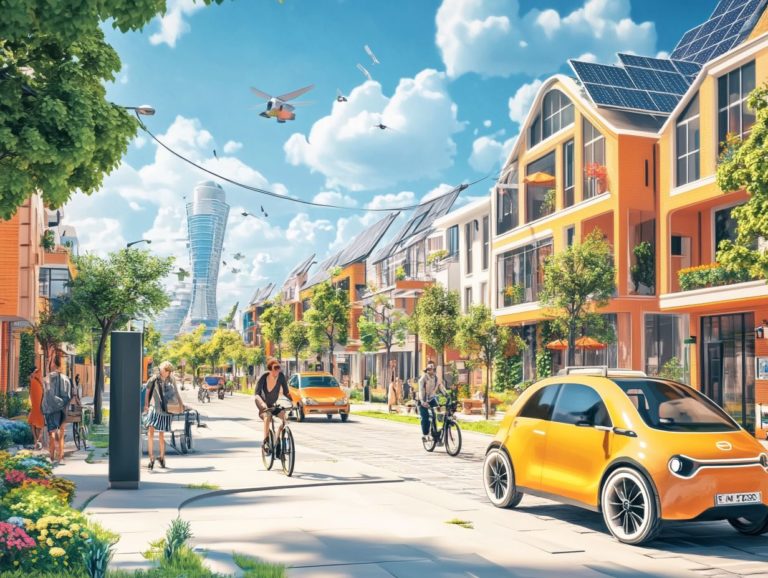The Effect of EV Adoption on Pollution Reduction
Electric vehicles (EVs) are revolutionizing our perspective on transportation and its environmental impact.
As concerns about air quality and climate change intensify, let s explore how adopting EVs can help clean our air! This discussion highlights how embracing electric vehicles can significantly curb air pollution and greenhouse gas emissions, while also addressing the challenges of infrastructure limitations and costs.
You ll discover the government initiatives that are paving the way for a cleaner future and the potential for even greater pollution reduction as EV technology continues to evolve. Dive in as you uncover the multifaceted effects of electric vehicles on our planet.
Contents
- Key Takeaways:
- The Impact of Electric Vehicles (EVs) on Pollution
- Why Switching to Electric Vehicles Matters
- Decrease in Greenhouse Gas Emissions
- Challenges to EV Adoption
- Infrastructure Limitations
- Cost and Availability
- Government Initiatives and Incentives
- Future Outlook on Pollution Reduction with EVs
- Frequently Asked Questions
- What is the effect of EV adoption on pollution reduction?
- How do electric vehicles contribute to pollution reduction?
- What are the environmental benefits of EV adoption?
- How does EV adoption impact public health?
- What role does government policy play in promoting EV adoption for pollution reduction?
- What are some challenges to widespread EV adoption and its impact on pollution reduction?
Key Takeaways:
- Electric vehicles significantly reduce air pollution and greenhouse gas emissions, making them a strong solution for environmental issues.
- Key challenges include the need for better infrastructure and affordability. Government support and incentives are vital for boosting EV adoption.
- With ongoing technology advancements, the future of EVs looks bright for further pollution reductions. Supporting these initiatives can lead to a cleaner, sustainable future for all.
The Impact of Electric Vehicles (EVs) on Pollution
The impact of Electric Vehicles (EVs) on pollution is significant, marking a pivotal shift towards cleaner modes of transportation. By reducing our reliance on conventional vehicles, EVs play a crucial role in mitigating carbon pollution, which can harm air quality and public health. For a deeper understanding, explore the global impact of electric vehicle adoption.
The advancements in electric power technology, especially in states like California, underscore the potential of adopting EVs to lower greenhouse gas emissions gases that trap heat in the atmosphere and enhance urban air quality. Studies from the Electric Power Research Institute (EPRI), an organization that focuses on electric power research and development, detail how transitioning to electric vehicles can positively influence emissions.
Why Switching to Electric Vehicles Matters
The advantages of adopting electric vehicles (EVs) extend far beyond personal ownership. They encompass significant societal benefits, including reductions in emissions and improved utilization of clean energy.
As we embrace electric vehicles, we participate in a broader movement toward a low-carbon future. By promoting renewable energy sources, enhancing air quality, and fostering sustainability in the transportation sector, our choices contribute to a healthier planet for everyone.
Reduction in Air Pollution
One of the most significant impacts of electric vehicles is their ability to reduce air pollution, greatly enhancing the overall air quality in urban environments. By choosing EVs over conventional vehicles, we contribute to a noticeable decrease in emissions of particulate matter and nitrogen oxides (NOx), while also considering the effect of EVs on energy demand and supply.
A recent study revealed that electric vehicles can slash particulate matter emissions by up to 80% compared to gasoline-powered cars, dramatically lowering harmful pollutants in the air. Data also shows that transitioning to electric vehicles can cut nitrogen oxides emissions by nearly 50% in urban areas, aiding in compliance with air quality standards.
This change is particularly crucial in densely populated cities, where poor air quality is linked to respiratory issues and cardiovascular diseases, affecting millions of people.
By prioritizing the adoption of EVs, we enable urban planners and policymakers to cultivate cleaner, healthier environments, ultimately leading to significant improvements in public health and quality of life.
Join the electric vehicle revolution today for a cleaner tomorrow! Explore your options for EVs and join the movement towards a healthier planet!
Decrease in Greenhouse Gas Emissions
Adopting electric vehicles leads to a remarkable reduction in greenhouse gas emissions, playing a vital role in the global initiative to combat climate change. By harnessing clean energy sources, EVs operate with significantly lower carbon emissions than traditional vehicles, making them key players in achieving emissions reductions within the transportation sector.
As renewable energy sources like solar and wind gain momentum, the environmental advantages of transitioning to electric vehicles become even more evident. For example, research indicates that switching to an electric vehicle can slash an individual s carbon footprint by as much as 50% compared to a conventional gasoline vehicle.
A report from the International Energy Agency underscores that if the widespread adoption of EVs continues, global carbon dioxide emissions from cars could plummet by nearly 1.5 gigatons annually by 2030. This transformation not only enhances air quality and public health but also aligns with international climate objectives, paving the way for a more sustainable future.
Challenges to EV Adoption
Despite the myriad advantages, embracing electric vehicles presents several challenges that obstruct their widespread acceptance and seamless integration into the transportation landscape.
Infrastructure limitations, particularly the lack of charging stations and the substantial costs tied to acquiring electric vehicles, frequently dissuade potential consumers.
The lack of supportive policies complicates efforts to boost EV adoption in diverse markets.
Infrastructure Limitations
Infrastructure limitations pose a notable challenge to the adoption of electric vehicles, especially regarding the availability and accessibility of charging stations. The current charging infrastructure needs to evolve to meet the growing demand for electric vehicles. This evolution requires collaboration between electric utilities and government bodies to establish a comprehensive network that truly serves your needs.
As electric vehicle adoption speeds up, many areas face a shortage of adequate charging options, often leaving potential users feeling hesitant. This infrastructure gap affects not just urban settings but also rural communities, where charging stations are few and far between.
Electric utilities must play a vital role in this landscape by investing in and expanding charging networks, ensuring these stations are strategically located for convenience. By enhancing accessibility through advanced technology and a broader range of charging locations, utilities can significantly ease the transition to electric vehicles, alleviating range anxiety and fostering widespread adoption among various demographics.
Cost and Availability
Cost and availability are pivotal factors that influence the decision to adopt electric vehicles. Many prospective buyers often perceive battery electric vehicles (BEVs), which use only electric power, as pricier than their conventional counterparts. It s essential to grasp the cost dynamics and the financing options available for electric vehicle ownership to encourage broader acceptance among consumers.
Various government incentives and rebates exist to ease the initial financial burden. However, many potential buyers might not be fully aware of the range of financial assistance programs at their disposal. These programs can significantly enhance affordability, especially for low-income households, thereby expanding the market for electric vehicle options.
Exploring creative financing solutions like leasing or flexible payment plans could also enable individuals to transition to these eco-friendly alternatives. As awareness increases, addressing the economic barriers that deter many from embracing electric vehicles becomes critical. Doing so could not only elevate adoption rates but also pave the way for a more sustainable future.
Government Initiatives and Incentives
Government initiatives and incentives significantly influence the adoption of electric vehicles, creating a strong support system that helps both consumers and manufacturers. By enacting effective electric vehicle policies and harmonizing with clean power plans, governments can actively foster the shift towards sustainable transportation while simultaneously reducing carbon emissions.
Join the movement towards a cleaner future by considering an electric vehicle today!
Support for EV Adoption
Support for electric vehicle adoption often comes through government policies aimed at encouraging your transition from conventional vehicles to electric ones. These policies not only incentivize you as a buyer but also promote the use of renewable energy for vehicle charging, enhancing the overall benefits of integrating EVs into your life.
Many local and national governments offer tax credits, rebates, and grants that significantly lower the upfront costs involved in purchasing an electric vehicle. Programs like subsidies for home charging station installations make the transition smoother for you.
In some areas, low-emission zones are being established, which restrict conventional vehicles while granting benefits to EVs. These government initiatives reshape your perception of electric mobility and positively influence your readiness to embrace it, paving the way for a more sustainable automotive future.
Future Outlook on Pollution Reduction with EVs
The future outlook for pollution reduction through electric vehicles is promising. With advancements in electric power technology and the shift towards electrified transportation, you are poised to witness even greater reductions in emissions on the horizon.
Continued investments in renewable energy and infrastructure are essential for unlocking the full potential of electric vehicles, ultimately transforming the transportation sector.
Potential for Further Reductions
You have the chance to significantly reduce emissions and air pollution by embracing electric vehicles, especially when backed by effective clean power plans and policies. As technology advances, the benefits of electric vehicles will keep getting better, leading to even greater improvements in air quality and a healthier environment.
With advancements in battery technology and the expansion of charging infrastructure, the appeal and practicality of electric vehicles will become even more enticing. If policymakers prioritize sustainable energy initiatives, they can create incentives for manufacturers and consumers alike, fostering innovation and widespread acceptance.
The cumulative impact of these advancements can result in a notable decrease in harmful pollutants, positively influencing urban air quality and improving public health. As more individuals and families shift towards cleaner transportation options, society may witness a substantial decline in respiratory ailments and other health issues tied to air pollution.
Frequently Asked Questions
What is the effect of EV adoption on pollution reduction?
The effect of EV adoption on pollution reduction refers to the impact that electric vehicle use has on reducing air pollution and greenhouse gas emissions. For more insights, explore the impact of EVs on urban air quality, as electric vehicles emit significantly fewer pollutants compared to traditional gasoline or diesel cars.
How do electric vehicles contribute to pollution reduction?
Electric vehicles contribute to pollution reduction by producing zero emissions while driving. They do not emit harmful pollutants like carbon monoxide, nitrogen oxides, and particulate matter, which are major contributors to air pollution and climate change.
What are the environmental benefits of EV adoption?
The environmental benefits of EV adoption include reducing air pollution and greenhouse gas emissions, decreasing dependence on fossil fuels, and promoting sustainable transportation. Electric vehicles also have a lower carbon footprint compared to traditional vehicles, making them a more environmentally friendly option.
How does EV adoption impact public health?
EV adoption positively impacts public health by reducing air pollution. This leads to improved air quality, which can help prevent respiratory and cardiovascular diseases caused by exposure to pollutants. Additionally, exploring the role of EVs in reducing carbon emissions further highlights their benefits, as they also help reduce noise pollution, making cities quieter and more livable.
What role does government policy play in promoting EV adoption for pollution reduction?
Government policies can be crucial in promoting EV adoption for pollution reduction. This includes providing incentives for purchasing electric vehicles, investing in charging infrastructure, and implementing regulations to reduce emissions from traditional vehicles. These policies help accelerate the transition to a cleaner and more sustainable transportation system.
By adopting electric vehicles today, you can enjoy cleaner air tomorrow!
What are some challenges to widespread EV adoption and its impact on pollution reduction?
The high cost of electric vehicles and limited charging stations are significant challenges to adopting EVs. Many drivers also fear running out of battery while driving, which is known as range anxiety.
As technology improves and more governments and companies invest in electric vehicles, these challenges will likely decrease. This means a brighter future for cleaner air and less pollution!






